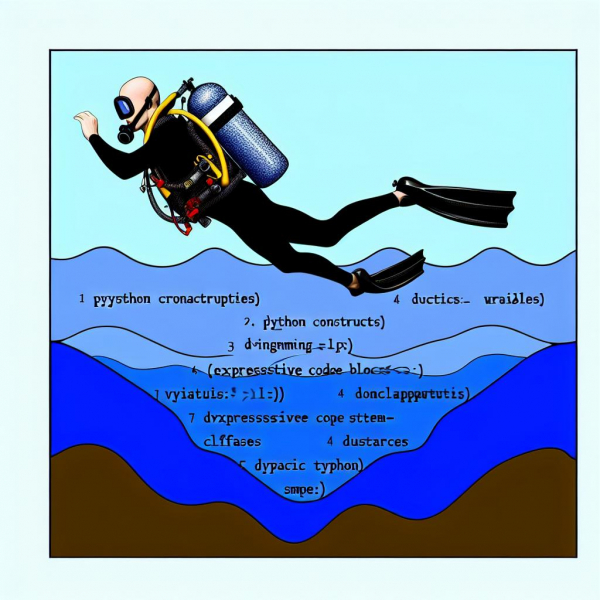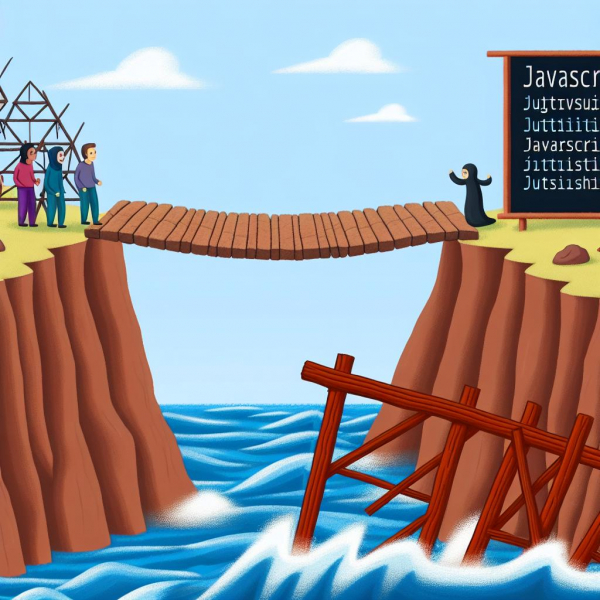In the vast, ever-evolving cosmos of web development, PHP has long been the North Star for many developers. Its ubiquity and ease of use have made it a go-to language for web projects of all shapes and sizes. But as the digital landscape continues to shift and transform, new constellations are emerging in the web development sky. These fresh alternatives to PHP are offering developers new ways to navigate their web projects, each with its own unique set of advantages. So, buckle up and prepare for a journey through the digital cosmos as we explore three compelling alternatives to PHP for your next web project.
Table of Contents
- Exploring the Limitations of PHP in Web Development
- Unveiling Three Powerful Alternatives to PHP for Web Projects
- Diving Deep into Python: A Dynamic and Versatile Option
- Why JavaScript is a Robust Alternative to PHP
- Ruby on Rails: A Modern and Efficient PHP Substitute
- Making the Right Choice: Factors to Consider When Choosing an Alternative to PHP
- Specific Recommendations for Transitioning from PHP to Other Languages
- Q&A
- In Summary

Exploring the Limitations of PHP in Web Development
While PHP has been a staple in web development for many years, it does have its limitations. These include a lack of modern programming concepts, slow execution speed, and poor error handling. As a result, developers are often on the lookout for alternatives that can offer more robust and efficient solutions. Here, we will discuss three such alternatives: Python, Ruby, and JavaScript.
Python is a high-level, interpreted programming language known for its simplicity and readability. It supports multiple programming paradigms, including procedural, object-oriented, and functional programming. Python’s extensive standard library and rich ecosystem of third-party packages make it a versatile choice for web development.
| Language | Key Features |
| Python | Simple syntax, Extensive standard library, Rich ecosystem |
Ruby, like Python, is a high-level, interpreted language. It is object-oriented and supports multiple programming paradigms. Ruby’s key selling point is its elegant syntax that is natural to read and easy to write.
| Language | Key Features |
| Ruby | Elegant syntax, Object-oriented, Supports multiple paradigms |
JavaScript is a high-level, interpreted programming language that is primarily used for enhancing web pages to provide for a more user-friendly experience. It is versatile and widely supported, making it a popular choice for web development.
| Language | Key Features |
| JavaScript | Versatile, Widely supported, Enhances web pages |
Each of these languages has its own strengths and weaknesses, and the choice between them will depend on the specific needs and constraints of your project. However, all three offer modern features and capabilities that can help overcome some of the limitations of PHP.

Unveiling Three Powerful Alternatives to PHP for Web Projects
When it comes to web development, PHP has long been a popular choice. However, as technology evolves, so do the options for web development languages. In this post, we’ll explore three powerful alternatives to PHP that you might want to consider for your next web project: Python, Ruby, and JavaScript.
Python is a high-level, interpreted programming language known for its readability and simplicity. It’s a versatile language that can be used for a wide range of applications, including web development. Python’s syntax is clean and easy to understand, making it a great choice for beginners. Some of the popular web frameworks for Python include Django and Flask.
- Django: Django is a high-level Python web framework that encourages rapid development and clean, pragmatic design. It’s built by experienced developers and takes care of much of the hassle of web development, so you can focus on writing your app without needing to reinvent the wheel.
- Flask: Flask is a micro web framework written in Python. It’s easy to learn and simple to use, allowing you to build your web app in a short amount of time.
Next up is Ruby, a dynamic, open-source programming language with a focus on simplicity and productivity. Ruby on Rails, or simply Rails, is a server-side web application framework written in Ruby. It’s a model-view-controller (MVC) framework, providing default structures for a database, a web service, and web pages.
Finally, we have JavaScript, a high-level, interpreted programming language that is a core technology of the World Wide Web. JavaScript is primarily used to enhance web pages to provide for a more user-friendly experience. Node.js is a platform built on Chrome’s JavaScript runtime for easily building fast and scalable network applications.
| Language | Web Framework |
|---|---|
| Python | Django, Flask |
| Ruby | Ruby on Rails |
| JavaScript | Node.js |
Each of these languages and their associated frameworks have their own strengths and weaknesses, and the best choice will depend on your specific needs and goals for your web project. So, don’t limit yourself to PHP – explore these alternatives and see if they might be a better fit for your next web project.

Diving Deep into Python: A Dynamic and Versatile Option
When it comes to web development, Python has emerged as a powerful alternative to PHP. Known for its simplicity and readability, Python offers a range of frameworks that can simplify the web development process. Django, Pyramid, and Flask are three such frameworks that have gained popularity among developers for their robust features and flexibility.
Django is a high-level Python web framework that encourages rapid development and clean, pragmatic design. Built by experienced developers, it takes care of much of the hassle of web development, so you can focus on writing your app without needing to reinvent the wheel. It’s free and open source.
- Pyramid is a small, fast, down-to-earth, open source Python web framework. It makes real-world web application development and deployment more fun, more predictable, and more productive.
- Flask is a lightweight WSGI web application framework. It is designed to make getting started quick and easy, with the ability to scale up to complex applications. It began as a simple wrapper around Werkzeug and Jinja and has become one of the most popular Python web application frameworks.
| Framework | Key Features |
|---|---|
| Django | High-level, Rapid development, Open source |
| Pyramid | Small, Fast, Productive |
| Flask | Lightweight, Easy to start, Scalable |
Each of these Python frameworks offers unique features and advantages that can be leveraged for web development projects. Whether you’re building a simple website or a complex web application, Python and its frameworks provide a dynamic and versatile option that can cater to your specific needs.

Why JavaScript is a Robust Alternative to PHP
When it comes to web development, JavaScript has emerged as a powerful contender to PHP. This dynamic programming language is not only versatile but also comes with a host of features that make it a robust alternative for web projects. JavaScript runs on the client side of the web, which makes it faster than PHP because it doesn’t have to wait for the server to respond. It also has a more modern syntax that is easier to read and write.
JavaScript’s capabilities extend beyond just making websites interactive. With the advent of Node.js, JavaScript can now be used on the server side as well. This means you can build an entire web application with JavaScript alone, making your project more efficient and easier to manage. Here are some key advantages of using JavaScript over PHP:
- Speed: As mentioned earlier, JavaScript runs on the client’s browser, reducing the load on the server and making the website faster.
- Universality: JavaScript is supported by all modern browsers, making it a universal language for client-side scripting.
- Interactivity: JavaScript allows you to create highly interactive websites with user-friendly interfaces.
- Frameworks: JavaScript has a wide range of frameworks like AngularJS, ReactJS, and Vue.js that make web development easier and more efficient.
| Language | Speed | Universality | Interactivity | Frameworks |
|---|---|---|---|---|
| JavaScript | High | High | High | Many |
| PHP | Medium | Medium | Low | Few |
In conclusion, JavaScript’s speed, universality, interactivity, and the availability of numerous frameworks make it a robust alternative to PHP for web projects.
Ruby on Rails: A Modern and Efficient PHP Substitute
When it comes to web development, Ruby on Rails has emerged as a powerful alternative to PHP. This open-source web application framework written in Ruby language is designed to make programming web applications easier by making assumptions about what every developer needs to get started. It allows you to write less code while accomplishing more than many other languages and frameworks. Experienced Rails developers also report that it makes web application development more fun.
One of the key advantages of Ruby on Rails is its convention over configuration philosophy. This means that the programmer does not have to spend a lot of time configuring files in order to get set up, Rails comes with a set of conventions which help speed up development. Another advantage is the Don’t Repeat Yourself (DRY) principle. The DRY principle is a philosophy of software development which states that ”Every piece of knowledge must have a single, unambiguous, authoritative representation within a system.” By not writing the same information over and over again, our code is more maintainable, more extensible, and less buggy.
- Convention over Configuration: Rails has a set of conventions which help speed up development.
- Don’t Repeat Yourself (DRY): The DRY principle makes our code more maintainable, more extensible, and less buggy.
- Active Record: Rails introduces the Active Record framework, which saves objects to the database. The Rails version of Active Record discovers the columns in a database schema and automatically attaches them to your domain objects using metaprogramming.
| Language | Framework | Principle |
| Ruby | Ruby on Rails | Convention over Configuration, DRY, Active Record |
Making the Right Choice: Factors to Consider When Choosing an Alternative to PHP
When it comes to choosing an alternative to PHP for your web projects, there are several factors you need to consider. Performance, scalability, and community support are among the most important. Performance refers to how fast the language can execute tasks. Scalability, on the other hand, is about how well the language can adapt to increasing demands. Lastly, community support is crucial as it determines the availability of resources and help when you encounter problems.
Let’s take a closer look at three popular alternatives to PHP: Python, Ruby, and JavaScript. Python is known for its simplicity and readability, making it a great choice for beginners. Ruby, particularly Ruby on Rails, is praised for its efficiency in building web applications. JavaScript, especially Node.js, is popular for its speed and versatility, as it can be used both on the client and server side.
| Language | Performance | Scalability | Community Support |
|---|---|---|---|
| Python | High | High | High |
| Ruby | Medium | High | High |
| JavaScript | High | High | Very High |
Remember, the right choice depends on your specific needs and the nature of your project. It’s always a good idea to experiment with different languages and see which one suits you best. Don’t be afraid to step out of your comfort zone and learn something new!
Specific Recommendations for Transitioning from PHP to Other Languages
When considering a transition from PHP to other languages for your web projects, there are several alternatives that offer unique benefits. These include Python, JavaScript, and Ruby. Each of these languages has its own strengths and can be a powerful tool in the right context.
Python is known for its simplicity and readability, making it a great choice for beginners. It’s also widely used in scientific computing, data mining, and machine learning, which could be beneficial for more complex web projects. Here are some key features of Python:
- Easy to learn and use
- Extensive support libraries
- Integration with web services
- User-friendly data structures
Next, JavaScript is a versatile language that’s become a staple in web development. It’s primarily used for enhancing web pages to provide for a more user-friendly experience. Key features of JavaScript include:
- Interactivity on websites
- Rich interfaces
- Handling real-time updates
- Extended functionality through additional scripts
Finally, Ruby is another strong alternative to PHP. It’s a dynamic, object-oriented language that’s often used for web and mobile app development. Here are some key features of Ruby:
- Very readable and self-documenting
- Flexible syntax
- Strong focus on testing
- Great for prototyping and agile methodologies
| Language | Best For | Key Feature |
|---|---|---|
| Python | Beginners, Complex Web Projects | Easy to learn, Extensive Libraries |
| JavaScript | Interactive Websites | Real-time Updates, Extended Functionality |
| Ruby | Web and Mobile App Development | Flexible Syntax, Strong Testing Focus |
Q&A
Q: What is the purpose of this article?
A: This article aims to introduce three alternatives to PHP for web projects, providing a fresh perspective for developers who are looking to explore new technologies.
Q: Why would someone want to look for alternatives to PHP?
A: While PHP is a popular and widely-used language for web development, it may not always be the best fit for every project. Exploring alternatives can open up new possibilities and potentially lead to more efficient or effective solutions.
Q: Can you name the three alternatives to PHP that are discussed in this article?
A: Certainly! The three alternatives to PHP discussed in this article are Python, Ruby, and JavaScript.
Q: What makes Python a good alternative to PHP?
A: Python is known for its simplicity and readability, which can make it a great choice for beginners. It also has a robust standard library and a large community of developers, making it a versatile choice for a wide range of web projects.
Q: How about Ruby? What are its strengths?
A: Ruby is praised for its elegant syntax and its powerful framework, Ruby on Rails. It’s a dynamic, object-oriented language that can be a great choice for web applications, particularly those that require rapid development.
Q: And what about JavaScript? Isn’t it primarily a client-side language?
A: While JavaScript was originally designed as a client-side language, the development of Node.js has made it a powerful option for server-side development as well. This means you can use the same language for both the front-end and back-end of your web project, which can streamline the development process.
Q: Are these alternatives suitable for all types of web projects?
A: Each language has its strengths and weaknesses, so the best choice will depend on the specific needs of your project. However, Python, Ruby, and JavaScript are all versatile languages that can be used for a wide range of web projects.
Q: Are these languages easy to learn for someone who is used to PHP?
A: Each of these languages has a different syntax and structure, so there will be a learning curve. However, they all have strong communities and plenty of resources available, so with some dedication, a PHP developer could certainly learn to use them effectively.
Q: Will using these alternatives affect the performance of my web project?
A: The performance of your web project will depend on many factors, including the efficiency of your code and the capabilities of your server. However, all three of these languages are capable of powering high-performance web applications.
Q: Are there any other alternatives to PHP that are worth considering?
A: Absolutely! There are many other languages out there that can be used for web development, including Java, C#, Go, and more. The best choice will depend on your specific needs and preferences.
In Summary
As we draw the curtains on this enlightening exploration, it’s clear that the realm of web development is not confined to the boundaries of PHP. Node.js, Python, and Ruby have emerged as compelling alternatives, each with its unique strengths and capabilities. They offer a fresh perspective, a different approach, and a new set of tools to create dynamic, robust, and efficient web projects. So, whether you’re a seasoned developer looking to diversify your skill set or a novice seeking the right language to start your journey, remember that the world of web development is as vast as it is varied. The choice is yours to make, and the possibilities are endless. Happy coding!
